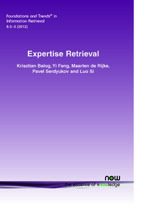Expertise Retrieval
By Krisztian Balog, Department of Computer and Information Science, NTNU, Norway, krisztian.balog@idi.ntnu.no | Yi Fang, Department of Computer Science, Purdue University, USA, yfang.purdue@gmail.com | Maarten de Rijke, Intelligent Systems Lab Amsterdam, University of Amsterdam, The Netherlands, derijke@uva.nl | Pavel Serdyukov, Yandex, Russia, pavser@yandex-team.ru | Luo Si, Department of Computer Science, Purdue University, USA, lsi@purdue.edu
Abstract
People have looked for experts since before the advent of computers. With advances in information retrieval technology and the large-scale availability of digital traces of knowledge-related activities, computer systems that can fully automate the process of locating expertise have become a reality. The past decade has witnessed tremendous interest, and a wealth of results, in expertise retrieval as an emerging subdiscipline in information retrieval. This survey highlights advances in models and algorithms relevant to this field. We draw connections among methods proposed in the literature and summarize them in five groups of basic approaches. These serve as the building blocks for more advanced models that arise when we consider a range of content-based factors that may impact the strength of association between a topic and a person. We also discuss practical aspects of building an expert search system and present applications of the technology in other domains, such as blog distillation and entity retrieval. The limitations of current approaches are also pointed out. We end our survey with a set of conjectures on what the future may hold for expertise retrieval research.
Expertise Retrieval
People have looked for experts since before the advent of computers. With advances in information retrieval technology and the large-scale availability of traces of knowledge-related activities, computer systems that can fully automate the process of locating expertise have become a reality. The past decade has witnessed tremendous interest and a wealth of results in expertise retrieval as an emerging subdiscipline in information retrieval. Expertise Retrieval highlights advances in models and algorithms relevant to this field. It draws connections among methods proposed in the literature and summarizes them in five groups of basic approaches. These serve as the building blocks for more advanced models that arise when a range of content-based factors that may impact the strength of association between a topic and a person are considered. It also discusses practical aspects of building an expert search system and presents applications of the technology in other domains such as blog distillation and entity retrieval. The survey also points out the limitations of these current approaches. Expertise Retrieval concludes with a set of conjectures on what the future may hold for expertise retrieval research. It is an ideal state-of-the-art reference for academic researchers, students, faculty, and anyone with an interest in how we locate expertise.
